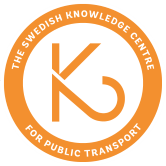Knowledge base for better collaboration in planning and implementation of Swedish BRT
Knowledge base for better collaboration in planning and implementation of Swedish BRT
High-quality bus systems, such as Bus Rapid Transit (BRT) are important to better utilize existing capacity in the road transport system, as well as to enable a modal shift from cars and thus contribute to a transport-efficient society. Several efforts to improve bus services have been implemented or are in the process of being implemented in Swedish cities. However, experiences from several of these initiatives shows that implementation of BRT is difficult. This is because, for example, different stakeholders have different conceptions of what BRT means in a Swedish context. Stakeholders such as municipalities, public transport authorities, operators and the Swedish Transport Administration often have different levels of ambition and thus different views on what measures are needed to achieve significant quality improvements in bus services. The guidelines for Swedish BRT that have been developed are too vague in concrete planning situations. Consequently, there is a risk that implemented investments are characterized by compromise solutions, which means that the intended quality increase and thus the potential for modal shift are absent.
Thus, there is a need to develop knowledge about planning and implementing BRT initiatives that contribute to, and fit into a more transport-efficient society. An important part of such knowledge is to evaluate the type of solutions that implemented BRT initiatives in Sweden have resulted in, for example, concerning accessibility, priority, frequency, convenience and other important factors that affect the attractiveness of bus services.
Since both planning and implementation of BRT assume collaboration between different actors, more knowledge is also needed about the basis for the decisions that are made. There is currently no systematic knowledge of forms of collaboration for implementing BRT in Sweden, or what are the advantages and disadvantages of different forms of collaboration.
The proposed project is based on the lack of knowledge about BRT, which is found in four important areas:
1. Need for knowledge of BRT in a Swedish context. How can a common understanding of what BRT means in a Swedish context be concretized and anchored with relevant actors?
2. What quality of solutions have implemented BRT investments resulted in? How does quality and function differ between different implemented and planned investments in Swedish cities?
3. Why does the quality and function of BRT differ between different cities? How do different forms of collaboration influence the decisions made in planning and implementation processes?
4. How can well-functioning collaboration be created between the various actors involved in planning and implementing BRT in Sweden?
